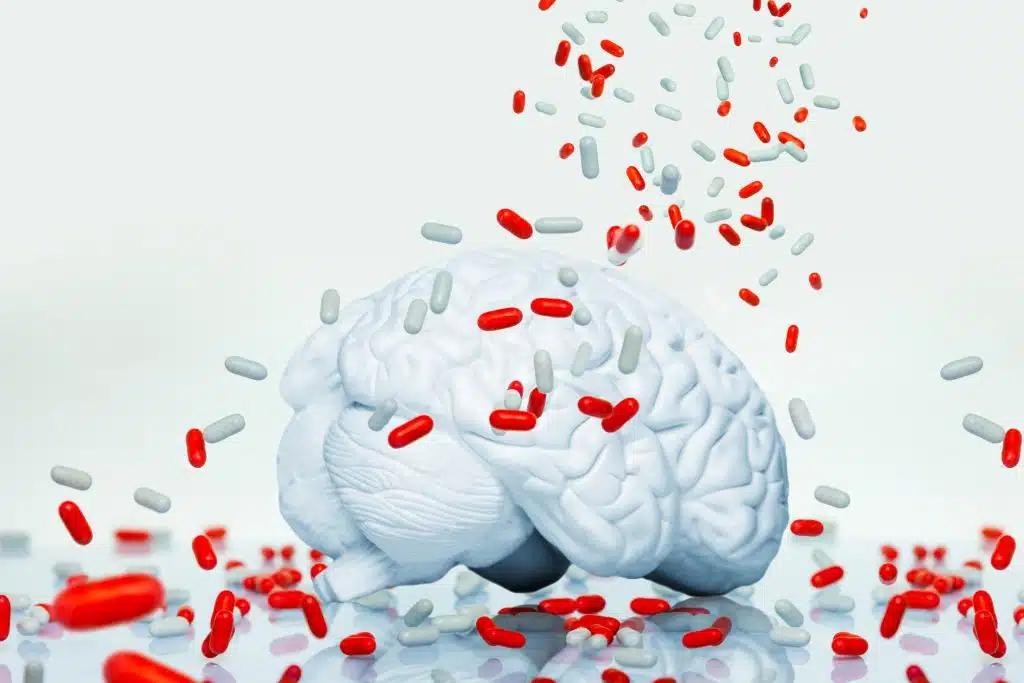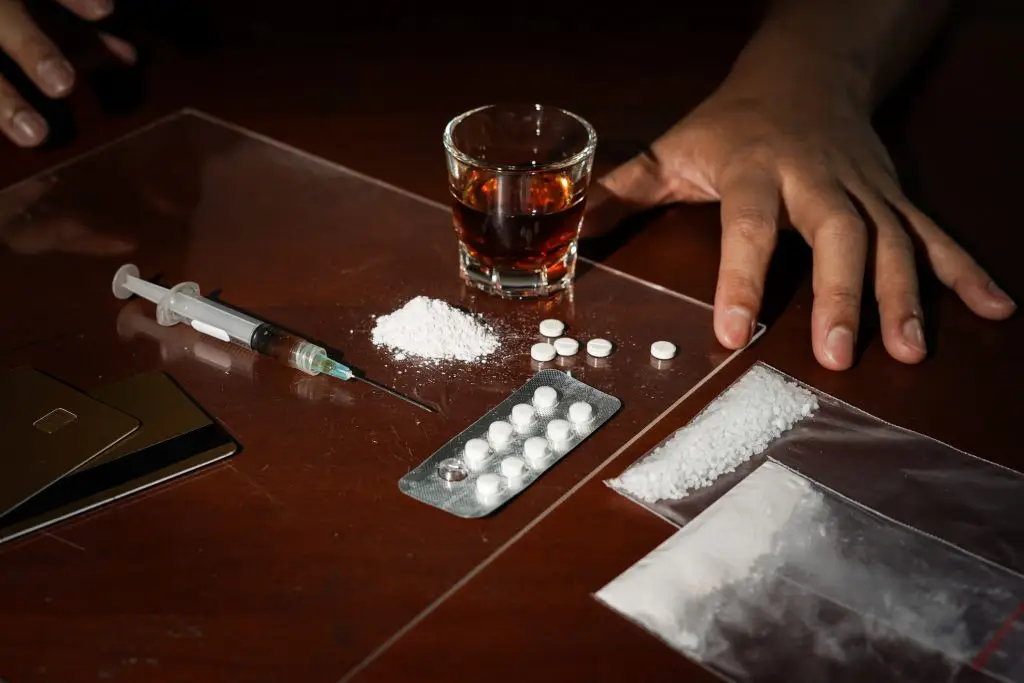
Research on the use of addictive drugs indicates that these substances cause lasting brain changes leading to compulsive use. This article explains how addiction affects the brain, the impact of various drugs, and treatment options.
Key Takeaways
- Drug addiction is a chronic condition characterized by compulsive drug-seeking behavior and significant alterations in brain function, complicating recovery efforts.
- Addictive substances hijack the brain’s reward system, particularly through dopamine pathways, leading to decreased sensitivity to natural rewards and heightened cravings.
- Effective treatment requires personalized plans that address individual mental health issues and use medications to manage cravings and withdrawal symptoms, informed by ongoing research into neurobiological mechanisms.
Understanding Drug Addiction
Drug addiction is a chronic condition characterized by persistent brain changes that drive compulsive drug-seeking behavior. It is widely recognized as a relapsing disease, meaning that individuals can return to drug use after periods of abstinence.
The journey into addiction often begins with voluntary drug use, but over time, the brain’s chemistry and function are altered, making it increasingly difficult to control the urge to take drugs.
Recognizing the initial motivations for drug use and the development of addiction is vital for tackling this complex issue. Often, drug abuse begins with the pursuit of pleasure or relief from negative emotions but can rapidly become a compulsive cycle of use and dependency.
Further exploration will reveal the underlying mechanisms contributing to this destructive behavior.
What is Drug Addiction?
Addiction is a chronic disorder that tends to relapse. It is characterized by the compulsive seeking and use of drugs, even when there are harmful consequences involved. Classified as a brain disorder, addiction involves functional changes in the circuits controlling reward, stress, and self-control.
These alterations hinder individuals’ ability to resist drug urges, resulting in substance use disorders that significantly impair daily life. Heavy drinking and drug use during adolescence can disrupt normal brain development, particularly in the frontal cortex, further complicating the path to recovery.
Individuals with addiction often exhibit impulsivity, an inability to resist urges, and a need for increased amounts of the substance to feel normal. Chronic use of addictive substances disrupts neuronal networks, diminishing pleasure from natural rewards and impacting overall quality of life.
Untreated addiction can persist lifelong and may eventually lead to death. Long-term substance misuse changes brain structure and function, complicating the recovery process.
Why People Use Drugs
The initial decision to take drugs is typically a voluntary choice, often influenced by the desire for pleasurable experiences or relief from negative emotions. The euphoric or intensely pleasurable feelings from initial use motivate repeated substance use despite the risks.
This cycle of pleasure and relief leads individuals to continue using drugs, even when they are aware of the potential consequences.
Relief from stress, anxiety, and depression can also negatively reinforce substance use. Adolescence is a critical period for vulnerability to substance use, as young people are more likely to experiment with drugs and develop patterns of use that can lead to addiction.
Recognizing these initial motivations is crucial for devising effective prevention and intervention strategies.
Find Hope and Healing: Call Us Now!
Take the first step towards a brighter future! If you or a loved one is seeking support for substance abuse, we are here to help. Call us today and let our dedicated team guide you to the right treatment options. Your path to recovery starts now!
- Connect with an expert addiction specialist 24/7/365
- Learn about treatment costs
- Arrange fast access to a treatment program
Request a Call
OR
Make a Call
The Brain’s Reward System and Addictive Drugs

Addictive drugs significantly influence the brain’s reward pathways, particularly affecting the dopamine system. The basal ganglia and the nucleus accumbens are key brain areas involved in addiction, affecting how rewards are processed.
These substances have powerful effects on the brain, leading to compulsive behaviors and altered emotional states.
Comprehending how addictive drugs hijack the brain’s reward system is crucial for creating effective treatments and interventions.
Role of Dopamine in Addiction
Addictive substances trigger a surge in dopamine levels, leading to intense pleasurable sensations that reinforce drug use. Many individuals persist in drug use despite knowing its harmful effects due to alterations in their brain’s reward system.
The preoccupation/anticipation stage is marked by increased glutamate activity, which enhances cravings for substances. This cycle of pleasure and craving drives continued drug use and makes quitting difficult.
Hijacking the Brain’s Reward System
Dopamine and opioid neurotransmitters mediate the rewarding effects of addictive substances, which activate these systems to induce pleasure and reinforce drug use.
Over time, the brain’s reward system is hijacked, making it difficult for individuals to derive pleasure from natural rewards and driving compulsive substance-seeking behavior.
Neurobiological Changes from Chronic Drug Use
Long-term substance abuse leads to enduring alterations in the brain’s structure and functioning. Addictive substances significantly alter brain function, especially in areas responsible for motivation and reward.
Over time, these changes overstimulate the brain’s reward circuit, reducing its sensitivity and making daily pleasures harder to experience.
These changes in brain chemistry play a significant role in relapse in substance use disorders.
Impact on Dopamine Receptors
Dopamine receptors play a crucial role in the brain’s reward system, influencing how pleasure is experienced. Chronic drug use can lead to a significant reduction in dopamine receptors, impairing the brain’s ability to experience pleasure naturally.
Substance use disorders are associated with cognitive impairments, including deficits in executive function and decision-making. Dysfunction in the prefrontal cortex, a region involved in decision-making and impulse regulation, can exacerbate substance-seeking behaviors.
Structural Brain Changes
Changes in areas critical to judgment, decision-making, learning and memory, and behavior control occur in the human brain of individuals with addiction. Prolonged drug use leads to structural brain changes, particularly in key areas like the prefrontal cortex and nucleus accumbens.
These structural changes significantly impact an individual’s ability to make decisions, control impulses, and manage behaviors related to addiction.
Find Hope and Healing: Call Us Now!
Take the first step towards a brighter future! If you or a loved one is seeking support for substance abuse, we are here to help. Call us today and let our dedicated team guide you to the right treatment options. Your path to recovery starts now!
- Connect with an expert addiction specialist 24/7/365
- Learn about treatment costs
- Arrange fast access to a treatment program
Request a Call
OR
Make a Call
Factors Influencing Addiction Risk
Biological factors such as genetic makeup, developmental stage, gender, and ethnicity can significantly affect the risk of addiction. Genetic factors and environmental influences together explain between 40 to 60 percent of an individual’s addiction risk.
Psychological factors, such as mental health disorders, alongside genetic and developmental histories also play a crucial role in the risk of substance use disorders. Animal studies indicate that both genetic predispositions and environmental contexts shape behaviors related to substance use.
Genetic Predisposition
Genetic factors significantly contribute to addiction risk, accounting for 40 to 70 percent of individual differences, highlighting the crucial role of heredity in susceptibility to addiction.
The development of substance use disorders involves a complex interplay between genetic predispositions and environmental factors. Genetic variations significantly affect how individuals metabolize substances, impacting their addiction risk.
Specific genes associated with addiction risk include variants related to alcohol and nicotine metabolism, as well as neurotransmitter receptors.
Environmental Influences
Factors such as family, school, and neighborhood environments significantly increase addiction risk. Adolescence is identified as a critical period when vulnerability to substance use increases due to environmental influences.
Family dynamics, particularly early interactions, are essential to children’s healthy development and can influence their drug use risk.
Environmental cues linked to substance use can trigger intense feelings of cravings, even when the substance’s effects have faded.
The Addiction Cycle

The addiction cycle encompasses three main phases: binge/intoxication, withdrawal/negative affect, and preoccupation/anticipation. Addictive drugs alter the brain’s reward system, which can shift behaviors towards habitual drug-seeking.
These substances disrupt normal neurotransmitter signaling, leading to compulsive drug-seeking behavior.
Drug-induced brain chemistry changes can severely impair decision-making and self-control.
Binge/Intoxication Stage
The basal ganglia play a crucial role in the rewarding effects of substances during the binge/intoxication stage. In addiction, the basal ganglia produce feelings of pleasure and control habitual substance use.
Patterns of opioid addiction often involve cycles of intense intoxication, tolerance development, increased use, and withdrawal symptoms.
Similarly, alcohol addiction features heavy drinking followed by a withdrawal period characterized by emotional and physical distress. Stimulant addiction typically involves cycles of binge use followed by a crash that includes negative emotions.
Withdrawal/Negative Affect Stage
The extended amygdala is crucial for mediating feelings of unease, anxiety, and irritability during withdrawal. Negative emotional states during withdrawal stem from stress system activation in the extended amygdala and the nervous system.
Neurotransmitters like corticotropin-releasing factor (CRF) and norepinephrine are significantly activated during the withdrawal phase, contributing to negative feelings.
Preoccupation/Anticipation Stage
The prefrontal cortex’s dysfunction leads to impulsive, habit-like substance-seeking behaviors during this stage. During the preoccupation/anticipation stage, individuals actively seek substances after a period of abstinence.
Craving after the crash from stimulant use is driven by environmental cues and internal emotional states.
When craving is triggered, the nucleus accumbens releases glutamate, reinforcing cravings.
Different Substances, Different Effects
Various classes of addictive substances produce distinct changes in brain function and behavior during addiction. Each type of drug impacts the brain differently, influencing both brain function and behavior in unique ways.
Understanding these differences is crucial for developing tailored treatment approaches and improving recovery outcomes.
Opioids
Opioids are particularly prone to leading to addiction because they activate strong reward pathways in the brain. As opioid use continues, the body produces fewer endorphins, requiring higher doses to achieve the same pleasurable effects.
Tolerance to opioids can lead to increased cravings and potential withdrawal symptoms when doses aren’t escalated.
Risk factors for opioid addiction include age, personal or family history of substance misuse, and environmental stressors. Misusing opioids, such as by snorting or injecting, greatly increases the risk of overdose and addiction.
Alcohol
Alcohol addiction is characterized by patterns of binge drinking followed by withdrawal. Severe emotional and physical withdrawal syndrome is associated with severe alcohol use disorder.
Alcohol interacts with neurotransmitter systems in the brain by affecting GABA and glutamate, producing euphoria, as well as having sedating, motor impairing, and anxiety-reducing effects.
Alcohol’s widespread use and social acceptance pose significant challenges for addiction research and treatment.
Stimulants
Stimulants increase dopamine levels by stimulating release or inhibiting removal from synapses. These drugs have a significant impact on brain function, particularly in enhancing neurotransmitter activity. The elevation of dopamine levels due to stimulant use can lead to bingeing behaviors.
This results in cycles of highs and crashes as the body attempts to readjust to the altered neurotransmitter levels.
Marijuana (Cannabis)
Marijuana increases dopamine in the basal ganglia. Cannabinoids like THC affect dopamine neuron function and increased dopamine release in the nucleus accumbens. A significant stage during cannabis use is the binge/intoxication stage.
Marijuana addiction follows a pattern involving significant intoxication episodes, leading to daily use and chronic intoxication.
Synthetic Drugs
Synthetic drugs like bath salts and synthetic cannabinoids can produce effects similar to stimulants but are often much stronger. These substances can unpredictably and severely affect brain function and behavior, making them especially dangerous and hard to treat.
Find Hope and Healing: Call Us Now!
Take the first step towards a brighter future! If you or a loved one is seeking support for substance abuse, we are here to help. Call us today and let our dedicated team guide you to the right treatment options. Your path to recovery starts now!
- Connect with an expert addiction specialist 24/7/365
- Learn about treatment costs
- Arrange fast access to a treatment program
Request a Call
OR
Make a Call
Treatment and Recovery

Many people can stop using addictive drugs without treatment, but for others, personalized treatment plans are essential for recovery. These plans consider individual circumstances like mental health issues and trauma.
Understanding the neurobiological factors in recovery can lead to more effective treatment strategies for substance use disorders.
Behavioral neuroscience addiction research has achieved limited success in developing novel therapeutics, but ongoing efforts aim to enhance medications development efforts related to substance use disorders.
Medications for Addiction
Medications developed for substance use disorders often target cravings and withdrawal symptoms to aid recovery. Agonists are used in addiction treatment to simulate the effects of addictive substances, helping to reduce cravings.
These medications can play a crucial role in helping individuals manage their addiction and work towards long-term recovery.
Neurobiological Effects of Recovery
The understanding of substance use effects on the brain is incomplete, and little is known about the factors that influence long-term recovery from substance use disorders. Additional research is needed to understand the physical effects of emerging addictive substances.
Investigating neurobiological mechanisms that enable maintaining changes in substance use behavior is essential for informing effective treatment. Examining neurobiological processes underlying recovery is necessary to improve our understanding of recovery from substance use disorders.
Summary
In summary, drug addiction is a complex and multifaceted issue that involves significant changes in brain behavior. By understanding the mechanisms behind addiction, the brain’s reward system, and the neurobiological changes from chronic drug use, we can better address substance use disorders.
Recognizing the factors that influence addiction risk and the distinct effects of different substances helps in developing targeted treatments. Ongoing research into the neurobiological effects of recovery is crucial for improving treatment strategies.
Together, these insights offer hope for more effective interventions and a brighter future for those struggling with addiction.
Frequently Asked Questions
What is drug addiction?
Understanding its complexities is crucial for effective treatment and support.
Why do people initially use drugs?
How do addictive drugs alter the brain’s reward system?
What are some factors that influence addiction risk?
What are the stages of the addiction cycle?
Understanding these phases can help in recognizing the patterns of substance use and the cravings that accompany addiction.
Our helpline is 100%
free & confidential
If you or someone you care about is struggling with drug or alcohol addiction, we can help you explore your recovery options. Don’t face this challenge alone—seek support from us.
Programs
Resources
Will my insurance
cover addiction
treatment?
We're ready to help
Find the best
drug or alcohol treatment
center
Are you or a loved one struggling with addiction? Call today to speak to a treatment expert.



